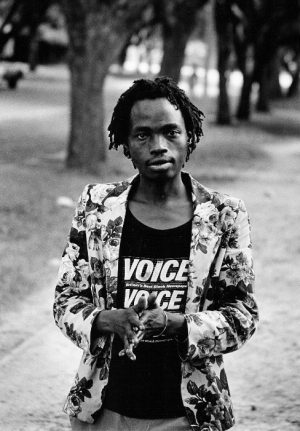Dambudzo Marechera

Dambudzo was born in Zimbabwe, then called Rhodesia, in 1952. In spite of an impoverished and destabilising family background, he excelled at school and won three important scholarships; to the prestigious St Augustine’s school as a boarder, to the University of Rhodesia for an English degree and, in 1974, to New College, Oxford University in the UK. In 1976, Dambudzo was expelled from Oxford, allegedly, for attempted arson, setting off a series of incredible episodes and escapades that characterised the rest of his life in the UK. He returned to Zimbabwe in 1982 with a British film crew. After disagreements with the producers, he disappeared into the slums of Harare, where he died as a homeless tramp in 1987.
It may not be possible to plot Dambudzo’s movements with any precision after he left Oxford University but it is certain he stayed in Oxford, Cardiff and several places in London, including a squat in Tolmers Sqare between 1976 and 1979.

The Tolmers Square community provided Dambudzo with a much-needed ‘sanctuary’, without which a homeless and penniless but hugely talented writer may have simply descended into complete oblivion. He certainly wrote his first two novels at No 20 Tolmers Square on the first floor. The white-washed room had only a floor mattress and his iconic typewriter. When House of Hunger (1978) and Black Sunlight (1980) were published, the novels startled the literary world with their brilliance; the kind evoked by some of the world’s greatest writers and poets. The squat in Tolmers Square became Dambudzo’s home. He continued to wander but he always returned to Tolmers Square, in “a life lived by whim”, as Alex succinctly puts it. ‘The people in the house are all refugees in one way or another, exiles from the war out there’, Zambudzo writes in ‘The Black Insider’ (Dambudzo Marechera Trust, 1990, p36). ‘Wanderers from unknown trouble…there is a workshop directly beneath my floor and every day it resounds with the sound of girls making posters for one of the factions fighting in the war.’
Kwesi Owusu writes: Dambudzo was my friend. I checked up on him a few times at Tolmers in 1977. However, I frequented the poster printing collective more often. I was then a student activist and came for radical posters for our Southern Africa freedom campaigns. Incidentally, this is an activity, Dambudzo refers to cynically in one of his essays! In 1980, I co-founded African Dawn, a poetry and music group. “Danger Man’, as I called him, was considered for membership but he declined, saying he stammered badly when reciting his own poems. African Dawn had an office at the Africa Centre in Covent Garden and Dambudzo dropped by there as well as the bookshop and various events. He had ‘a reserved stool’ at the bar downstairs. We spent many memorable years together as young African writers and poets in London.
Why the continuing interest in Dambudzo? He had an extraordinary personality and is undoubtedly one of the most brilliant writers of our generation. Tolmers Square secured his literary canon by offering him an abode in which to write his most popular novels. Today, Dambudzo is rated as one of the most exciting and critically acclaimed writers in African and world literature. The fascinating facets of his story need to be told for prosperity and as a lasting tribute to all the people that made it possible.
Alex Smith, Kwesi Owusu and Mandana Hendessi OBE, 2022
Stories by Dambudzo Marechera
No stories have been selected
Photos featuring Dambudzo Marechera
No photos have been selected